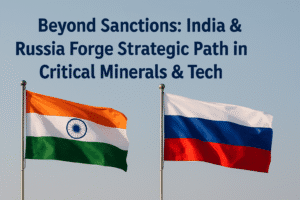Beyond Sanctions: India & Russia Forge Strategic Path in Critical Minerals & Tech
Despite recent US punitive tariffs, India and Russia are forging ahead with significant strategic cooperation, focusing squarely on securing critical minerals and advanced technology. High-level talks in New Delhi prioritized joint exploration and extraction of rare earth elements essential for clean energy and electronics, aiming to diversify global supply chains. The nations also deepened aerospace collaboration, including plans for a modernized wind tunnel, small aircraft engine production, and advanced carbon fibre research.
Cooperation extends to underground coal gasification for cleaner energy, alongside aluminium and fertiliser sourcing for economic stability. Both sides committed to modernising mining technology and industrial infrastructure, reinforced by capacity building. The partnership, co-chaired by India’s DPIIT Secretary Bhatia and Russia’s Deputy Minister Gruzdev, concluded with a signed protocol. This concerted push underscores a deliberate strategy to enhance mutual economic security and technological self-reliance. The collaboration sends a clear signal of their commitment to an independent, multipolar economic path amid external pressure.

Beyond Sanctions: India & Russia Forge Strategic Path in Critical Minerals & Tech
New Delhi, August 7, 2025 – Defying external economic pressure, India and Russia have significantly deepened their industrial and technological partnership, placing cooperation on rare earth elements (REEs), critical minerals, and advanced aerospace technologies at the forefront of their bilateral agenda. This strategic push emerged from the high-profile 11th session of the India-Russia Working Group on Modernisation and Industrial Cooperation, held Wednesday in New Delhi.
Navigating Geopolitical Headwinds The talks gained particular significance as they unfolded against the backdrop of recent US punitive tariffs imposed on Indian goods, partly motivated by India’s continued economic engagement with Russia. Undeterred, officials from both nations demonstrated a clear commitment to advancing their mutually beneficial relationship, focusing on sectors deemed vital for long-term economic security and technological advancement.
Core Areas of Collaboration:
- RareDespite recent US punitive tariffs, India and Russia are forging ahead with significant strategic cooperation, focusing squarely on securing critical minerals and advanced technology. High-level talks in New Delhi prioritized joint exploration and extraction of rare earth elements essential for clean energy and electronics, aiming to diversify global supply chains. The nations also deepened aerospace collaboration, including plans for a modernized wind tunnel, small aircraft engine production, and advanced carbon fibre research.
Cooperation extends to underground coal gasification for cleaner energy, alongside aluminium and fertiliser sourcing for economic stability. Both sides committed to modernising mining technology and industrial infrastructure, reinforced by capacity building. The partnership, co-chaired by India’s DPIIT Secretary Bhatia and Russia’s Deputy Minister Gruzdev, concluded with a signed protocol. This concerted push underscores a deliberate strategy to enhance mutual economic security and technological self-reliance. The collaboration sends a clear signal of their commitment to an independent, multipolar economic path amid external pressure.
- Infrastructure & Mining: Discussions covered creating modern industrial infrastructure and deepening cooperation in mining equipment, exploration technologies, and sustainable practices like industrial and domestic waste management. Capacity building and technology transfer were key themes.
Steering the Partnership The session was co-chaired by Amardeep Singh Bhatia, Secretary of the Department for Promotion of Industry and Internal Trade (DPIIT), and Alexey Gruzdev, Deputy Minister of Industry and Trade of the Russian Federation. The meeting, attended by approximately 80 delegates from both sides, reviewed progress since the last session and concluded with the signing of a formal Protocol, reaffirming the strategic nature of the India-Russia partnership.
Why This Matters:
- Supply Chain Resilience: The REE/critical minerals collaboration is a direct move to reduce dependence on dominant suppliers like China, crucial for India’s clean energy and tech ambitions and Russia’s industrial diversification.
- Technological Leapfrogging: Joint ventures in aerospace composites, 3D printing, and engine production represent high-value, knowledge-intensive cooperation that can elevate both nations’ manufacturing capabilities.
- Geopolitical Signal: Continued and deepening cooperation, especially in sensitive sectors, demonstrates both countries’ commitment to pursuing their strategic economic interests despite Western pressure. It highlights the evolving dynamics of global trade alliances.
- Economic Diversification: Focus on coal gasification, fertilisers, aluminium, and mining modernisation addresses core industrial needs and resource security for both economies.
The Path Forward The 11th session underscores that the India-Russia economic relationship is not merely weathering geopolitical storms but actively evolving towards more sophisticated, technology-driven, and strategically vital cooperation. The focus on rare earths, critical minerals, and cutting-edge aerospace and materials science points to a shared vision of long-term industrial self-reliance and a significant role in the emerging multipolar global supply chain landscape. While challenges remain, this partnership signals a determined effort to carve out independent technological and economic futures.
You must be logged in to post a comment.